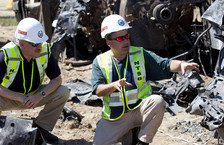An aircraft accident investigator has to work out exactly how and why an aircraft accident happens. It may appear to be a gruesome task, but is in fact very rewarding. It is a position that is essential to the aviation industry to keep us flying safe, as every accident is usually made up of a chain of events – the Aircraft Accident Investigator has to link those chain of events and then apply measures to stop those links happening again.
What is the role of an aircraft accident investigator?
The main duties of an aircraft accident investigator are:
- Examine the aircraft, instruments and engines for evidence
- Examines the black boxes
- Interview survivors and witnesses
- Reviews maintenance and flight records
- Analyze data to identify any safety issues
- Review operations and human performance
- Communicates with the airport and air traffic control in reference to the accident
- Determines the cause of the accident from all given evidence
An aircraft accident investigator will be required to:
- Have excellent communication skills
- Be empathetic
- Be precise
- Be inquisitive
- Have an analytical mind
- Be able to speak in public and write well
- Be physically fit
Basic requirements and qualifications
To become an aircraft accident investigator you should have a good high school education and preferably a bachelor’s degree in aeronautics or aircraft engineering. You may also be a pilot, so will need to pass a medical and have a PPL (Private Pilot’s License) and a CPL (Commercial Pilot’s License). You will also have an IR (Instrument rating) on the aircraft type. Experience of aircraft design and manufacture and flight safety and operations are highly beneficial. You may also have experience as a flight instructor, aircraft mechanic or worked in the military.
Training options
There are numerous ways to gain the pilot training required in the first instance. You can take either an intensive ‘integrated’ course or a ‘modular’ course which you take at your own pace and within your budget. Another option is to take a university degree in aeronautics or aviation that will include your PPL and CP licenses as well as IR.
How to apply
You will find such positions with the aviation authorities such as the FAA (Federal Aviation Administration) or CAA (Civil Aviation Authority) and with the NTSB (National Transportation Safety Board) and the AAIB (Air Accidents Investigation Branch). There will also be positions within the military or armed forces and with aircraft manufacturers.
Hours, salary and benefits
This position will be on a shift basis as well as being on call, there will be no set hours and work will be on demand.
Salary is made up of basic and premium pay, depending on hours worked.
|
|
Minimum P.A. |
Maximum P.A |
|
New aircraft accident investigator |
$20,000 USD |
$45,000 USD |
|
Experienced aircraft accident investigator |
$70,000 USD |
$100,000 USD |
Benefits may include health and life insurance and pension as well as any government provisions.
Prospects
This is a role which can be physically and mentally demanding and you will work under extreme pressure in often difficult circumstances - this is not a job suited to everyone. It is suited to very experienced pilots with a engineering or aircraft design background who also want to contribute to safety and are very analytical. It is also a very important role as aviation safety worldwide is dependent on the findings of all aircraft accident investigations. Further studies in accident investigation can be taken at Embry Riddle Aeronautical University.

